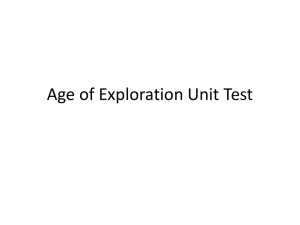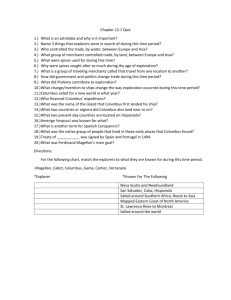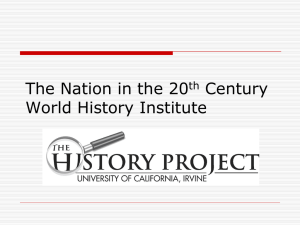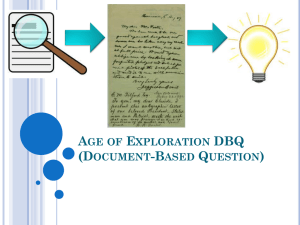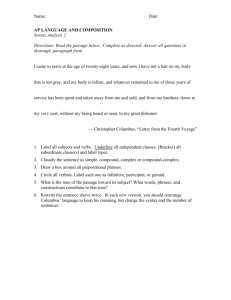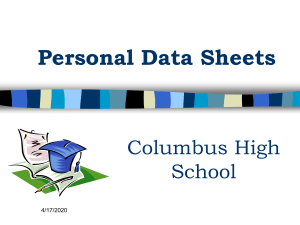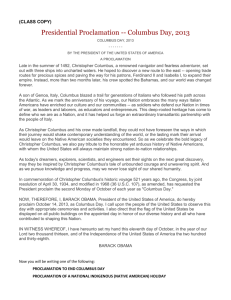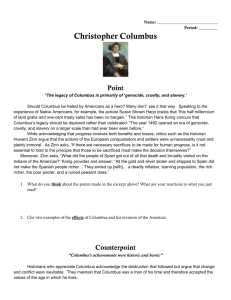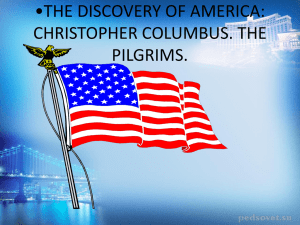Blog 1-3-Columbus Day
advertisement
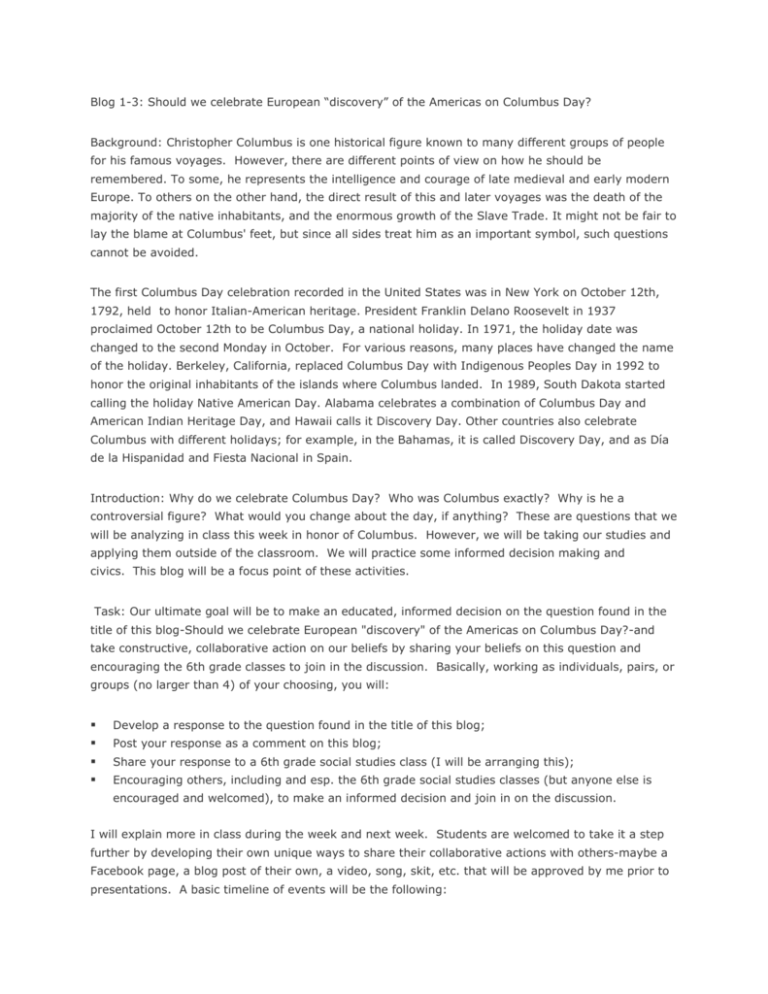
Blog 1-3: Should we celebrate European “discovery” of the Americas on Columbus Day? Background: Christopher Columbus is one historical figure known to many different groups of people for his famous voyages. However, there are different points of view on how he should be remembered. To some, he represents the intelligence and courage of late medieval and early modern Europe. To others on the other hand, the direct result of this and later voyages was the death of the majority of the native inhabitants, and the enormous growth of the Slave Trade. It might not be fair to lay the blame at Columbus' feet, but since all sides treat him as an important symbol, such questions cannot be avoided. The first Columbus Day celebration recorded in the United States was in New York on October 12th, 1792, held to honor Italian-American heritage. President Franklin Delano Roosevelt in 1937 proclaimed October 12th to be Columbus Day, a national holiday. In 1971, the holiday date was changed to the second Monday in October. For various reasons, many places have changed the name of the holiday. Berkeley, California, replaced Columbus Day with Indigenous Peoples Day in 1992 to honor the original inhabitants of the islands where Columbus landed. In 1989, South Dakota started calling the holiday Native American Day. Alabama celebrates a combination of Columbus Day and American Indian Heritage Day, and Hawaii calls it Discovery Day. Other countries also celebrate Columbus with different holidays; for example, in the Bahamas, it is called Discovery Day, and as Día de la Hispanidad and Fiesta Nacional in Spain. Introduction: Why do we celebrate Columbus Day? Who was Columbus exactly? Why is he a controversial figure? What would you change about the day, if anything? These are questions that we will be analyzing in class this week in honor of Columbus. However, we will be taking our studies and applying them outside of the classroom. We will practice some informed decision making and civics. This blog will be a focus point of these activities. Task: Our ultimate goal will be to make an educated, informed decision on the question found in the title of this blog-Should we celebrate European "discovery" of the Americas on Columbus Day?-and take constructive, collaborative action on our beliefs by sharing your beliefs on this question and encouraging the 6th grade classes to join in the discussion. Basically, working as individuals, pairs, or groups (no larger than 4) of your choosing, you will: Develop a response to the question found in the title of this blog; Post your response as a comment on this blog; Share your response to a 6th grade social studies class (I will be arranging this); Encouraging others, including and esp. the 6th grade social studies classes (but anyone else is encouraged and welcomed), to make an informed decision and join in on the discussion. I will explain more in class during the week and next week. Students are welcomed to take it a step further by developing their own unique ways to share their collaborative actions with others-maybe a Facebook page, a blog post of their own, a video, song, skit, etc. that will be approved by me prior to presentations. A basic timeline of events will be the following: Week of Oct 14th-Analyzing and evaluating the significance and impact of Columbus in class, examining the controversy surrounding Columbus Day from the articles provided at the end of the post below, reflecting on an answer. Week of Oct. 20th-Collaborating and developing responses to the question, posting said response on this post. Week of Oct 27th-Sharing their responses with 6th grade classes during our scheduled meeting time (again, I will be planning this part for you). Any questions or concerns, please see me. And please make sure to use the resources I provided below for help! Article 1-“Christopher Columbus: 3 things you think he did that he didn’t” By Valerie Strauss, October 14, 2013 Source: http://www.washingtonpost.com/blogs/answer-sheet/wp/2013/10/14/christophercolumbus-3-things-you-think-he-did-that-he-didnt/ “So you think that Christopher Columbus discovered America in the Niña, the Pinta and the Santa Maria and also, while he was at it, proved the Earth wasn’t flat? Wrong, wrong and wrong. Given that the European explorer has a U.S. federal holiday to his name — and is honored by holidays in other countries as well — let’s look at the disturbing truth about Columbus. *He didn’t prove that the Earth is round. Kids in school have long been taught that when Columbus set sail in 1492 to find a new route to the East Indies, it was feared he would fall off the edge of the Earth because people then thought the planet was flat. Nope. As early as the sixth century B.C., educated thinkers wrote about Earth as a sphere, and historians say there is no doubt that the educated in Columbus’s day knew quite well that the Earth was round. The big question for Columbus, it turns out, was not the shape of the Earth but the size of the ocean he was planning to cross. * The famous names of the ships he took on his famous 1492 trip across the Atlantic Ocean, the Niña, Pinta and Santa Maria,probably weren’t really named Niña, Pinta and Santa Maria. The Santa Maria was also known at the time as La Gallega, meaning The Galician.” The Niña is now believed to be a nickname for a ship originally called the Santa Clara, and the Pinta was probably also a nickname, though the ship’s real name isn’t clear. *Columbus didn’t “discover” America — he never set foot in North America. During four separate trips that started with the one in 1492, Columbus landed on various Caribbean. He also explored the Central and South American coasts. But he didn’t reach North America, which, of course, was already inhabited by Native Americans, and he never thought he had found a new continent. You may also remember that it is believed that Norse explorer Leif Erikson reached Canada perhaps 500 years before Columbus was born, and there are some who believe that Phoenician sailors crossed the Atlantic much earlier than that. And here’s something he did do that you may not know: * Columbus was a brutal viceroy and governor of the Caribbean islands on which he did land. He committed atrocities against native peoples on the islands and decimated their populations while he also terrorized Spanish colonists, according to the biography “Columbus” by Laurence Bergreen. Article 2-Columbus should be celebrated By David A. Sprecace, April 20th, 2007. Source: http://www.denverpost.com/opinion/ci_5707643 David A. Sprecace is former president of the Denver Columbus Day Parade Commmittee and share his opinion below. Columbus Day has been a federal holiday since President Franklin D. Roosevelt first proclaimed it such in 1934. Over one hundred years ago, Colorado Senator Casimo Barela's bill was signed into law, designating Oct. 12 of each year as a public holiday known as Columbus Day. Roosevelt and Barela recognized the significant achievements of Christopher Columbus, and rightly chose, with millions of other Americans, to honor him. Columbus possessed admirable qualities, of which all Americans can be proud. Even by his detractors, he is seen as a skilled sea captain of the highest order. He challenged the thought that the Earth was flat, seeking to "reach the east by going west," an idea to which the scientists of the day were forcibly opposed. He sought glory, wealth and a title of nobility by opening new trade routes to China and Japan. Most importantly, though, Columbus discovered the American continental coast and recorded the voyage in a way that enabled others to repeat the feat. The real achievement worthy of holidays, monuments and namesake cities is that he opened a route that could be sailed again by himself and others. It is Columbus' method of discovery and record-keeping that separates him from other explorers who may previously have "discovered" the New World. He opened the door to further discovery by explorers like Magellan, Cooke, Drake and Hudson. His discovery led to the creation of the greatest nation on Earth, the United States of America. Today, Columbus is a scapegoat for European sins committed in the Americas by nonNative Americans over the past 500 years. Those who oppose Columbus Day blame Columbus and only Columbus - for acts of genocide, the continued suffering of indigenous people, the slave trade in the entire Western hemisphere, the United States governmental policy of Manifest Destiny, and the loss of rights of native peoples throughout the Americas. To blame Columbus for any of these, though, is to overlook the policies, groups and individuals who practiced slavery and committed heinous crimes against humanity, including the French, English, U.S. and Spanish governments, Thomas Jefferson and other founding fathers, the Confederate States of America, the Ku Klux Klan, and the U.S. military officers who massacred Native Americans at places like Sand Creek. Place blame on those who deserve it, not on Christopher Columbus. Article 3-“'Taking Stand Against Racism and Discrimination,' Seattle Adopts Indigenous Peoples' Day” By Andrea Germanos, October 7, 2014 Source: http://www.commondreams.org/news/2014/10/07/taking-stand-against-racism-anddiscrimination-seattle-adopts-indigenous-peoples-day Word Bank Indigenous-native to an area; Indigenous people of America are the American Indians The Seattle City Council on Monday unanimously adopted a resolution to celebrate the second Monday in October as Indigenous Peoples' Day. While the day is marked federally as Columbus Day, the resolution states the newly recognized day will be an opportunity for the city "to celebrate the thriving cultures and values of the Indigenous Peoples of our region." "The City of Seattle strongly encourages Seattle Public Schools to include the teaching of indigenous people's history," the text also notes. Councilmember Kshama Sawant, one of the sponsors of the resolution, said at the Council meeting that it "is about more than just a name change. It is about educating ourselves and our children, about taking a stand against racism and discrimination." In response to objections to those who felt the change would be an affront to Italian-Americans, Sawant said that the true Italian-Americans to be celebrated are those who engaged in struggles for social justice. Bill Bigelow, Curriculum Editor of Rethinking Schools and co-editor of Rethinking Columbus, which offers resources for teaching about the impact of Columbus on the Americas, said he was happy. "Too many children still learn the myth that Christopher Columbus discovered America. It's not a harmless story," he told Common Dreams. "The Columbus myth erases the humanity of Indigenous Peoples and offers legitimacy to the notion that it's OK for big countries to bully little countries and for white people to dominate people of color. These are not values our children should learn. I hope Seattle's resolution inspires other cities and school districts to rethink Columbus and to honor Indigenous Peoples," Bigelow said.
